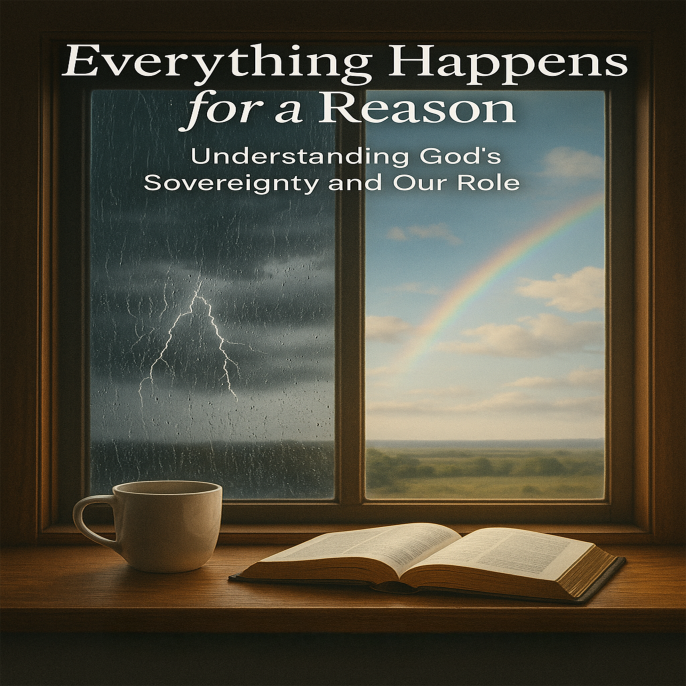Everything Happens for a Reason: Understanding God's Sovereignty and Our Role

Everything Happens for a Reason: Understanding God's Sovereignty and Our Role
June 18, 2025 | The Way of Life Church Blog
Have you ever faced a difficult situation and heard someone say, "Everything happens for a reason"? While this statement is true, our understanding and response to it can sometimes be misguided. God is indeed sovereign over all things, but that doesn't mean we should adopt a fatalistic attitude toward life's challenges.
Is "Everything Happens for a Reason" Biblical?
Unlike some other concepts we've examined in this series, the idea that everything happens for a reason is actually true. God is sovereign over the universe and everything that happens in this world. Isaiah 45:7 confirms this: "I form light and create darkness, I make well-being and create calamity, I am the Lord who does all these things."
Romans 8:28 further tells us that "He causes all things to work together for good, for those who love Him and those who are called according to His purpose." God shapes reality and moves things in time. Governments rise and fall because of God.
As R.C. Sproul wisely noted: "If there is one single molecule in this universe running around loose, free of God's sovereignty, then we have no guarantee that any single promise of God would ever be fulfilled."
The Difference Between Faith and Fatalism
While God is sovereign, we must be careful not to confuse faith with fatalism. Fatalism says, "Whatever happens, happens" - suggesting we have no role to play. Faith, on the other hand, recognizes God's sovereignty while also acknowledging our responsibility to act.
Sometimes we use the phrase "everything happens for a reason" not to promote faith but to communicate fatalism:
- "Maybe it was God's intention for me to lose that job" (when perhaps you weren't performing well)
- "It must be God's will for me to go through this health issue" (when there were warning signs you ignored)
The Widow of Zarephath: Faith in Action
In 1 Kings 17:8-16, we find a powerful example of how God's sovereignty works alongside human responsibility. During a severe drought, God told the prophet Elijah: "Go to Zarephath... I have commanded a widow there to feed you."
When Elijah arrived and asked the widow for bread, her response was surprising: "As the Lord your God lives, I have nothing baked, only a handful of flour in a jar and a little oil in a jug. And now I am gathering a couple of sticks that I may go in and prepare it for myself and my son, that we may eat it and die."
This reveals something fascinating: God had "commanded" this widow to feed Elijah, yet she had no knowledge of this command! She was simply trying to prepare a final meal for herself and her son before they starved to death.
What Can We Learn from This Widow's Story?
When Elijah asked her to make him bread first, promising that "the jar of flour shall not be spent, neither shall the jug of oil be empty," she had a choice to make. She could have said, "I guess it's just meant to be that my son and I die today" - a fatalistic response. Instead, she chose faith and acted on it.
The widow didn't know God's plan, but she responded in faith to the opportunity before her. And because of her faith, "she and he and her household ate for many days. The jar of flour was not spent, neither did the jug of oil become empty."
How Do We Discern Our Part in God's Purpose?
God is sovereign, but we always have a part to play in His purpose. Here are three ways to align yourself with God's will:
1) Pray Consistently
Prayer isn't just about asking for things; it's about knowing the God you're in relationship with. When you develop a growing prayer life, you become more in tune with God's will.
Elijah knew more than the widow because he had already witnessed God's provision. His relationship with God gave him confidence to trust God's direction.
2) Pursue Biblical Wisdom
Wisdom is the right application of right understanding. It's not enough to study the Bible; we must apply what we learn.
The widow didn't just hear the prophet's words - she acted on them. She made a decision to go beyond her circumstances and trust God's word. When we act on our understanding of Scripture, we experience God's blessings.
3) Trust God with the Results
We can't always anticipate how God will work things out, but we can trust that His results are always better than what we imagine.
Throughout Scripture, no one who trusted God ultimately came out worse for it. When you've done all you can do, hand the baton to God. As Romans 8:28-29 reminds us, God's definition of "good" is what makes us more like Jesus - not necessarily what feels good in the moment.
Life Application
This week, I challenge you to examine your response to difficult circumstances. Are you being fatalistic or faithful? Remember that you have a part to play in God's sovereign plan - not just for your life, but for the lives of those around you.
Ask yourself:
- In what area of my life am I saying "whatever happens, happens" when God is actually calling me to take action?
- What step of faith is God asking me to take right now that seems risky or uncomfortable?
- How might God be using my current circumstances to shape me to be more like Jesus?
Like the widow gathering sticks, you may feel you're at the end of your resources. But God may be positioning you for a miracle if you'll respond in faith rather than fatalism. Remember, everything does happen for a reason - and that reason includes your faithful response to God's sovereign plan.
